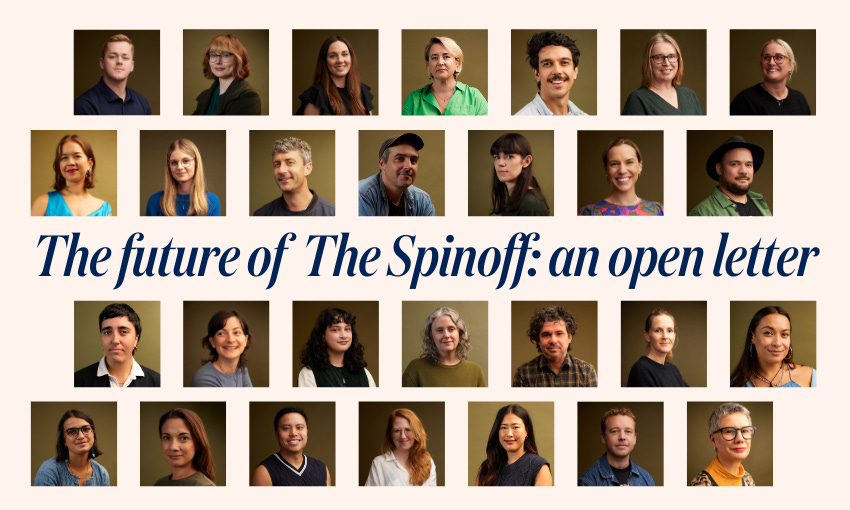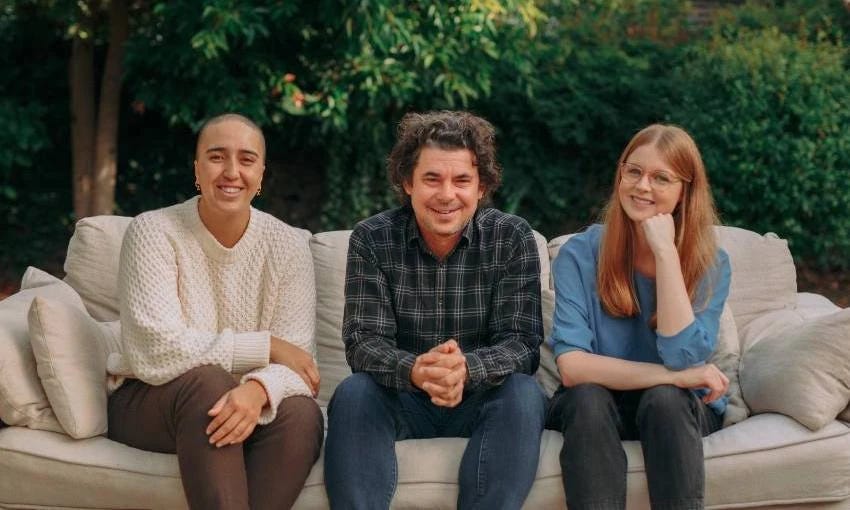Media Watch - In a Spin - The Spinoff Asks For Help Despite Reported 412,000 Readers in October and Google Contract
The New Zealand Reporter, a NZ Media Council digital member - Media Watch, a weekly opinion on the NZ media and its future. This week's spotlight is on The Spinoff's plight & Google relationship.
“We know we’re setting a big goal, but there is precedent. In March 2020 we lost all our advertisers as the Covid lockdown hit. We worked around the clock, creating coverage that circled the world. In just two weeks, we tripled our members, when many of you answered the call in our hour of need. It’s that time again. If just half the people who come to our homepage every day donated, we would be far better equipped for the troubling new operating environment we face.”
The Spinoff’s Amber Easby, Duncan Greive and Madelaine Chapman (pictured below) in today’s “open letter”.



Not long after publishing my opinion on the media last Thursday and complaining that New Zealanders need to pay for news and the government pass the Fair Digital Bargaining bill, I received a call for help from The Spinoff (known legally as Hex Work Limited).
The Spinoff’s emailed plea was signed by its CEO Amber Easby, founder and 46.25% shareholder Duncan Greive, and Editor, Madelaine Chapman. Chapman replaced Toby Manhire in 2021. Manhire has a 5% share in The Spinoff.
The Spinoff’s predicament is dire. They admit it. Staff have lost their job and cuts have been made.
This op-ed looks at The Spinoff’s predicament, what it is asking for, why it makes no mention of the Fair Digital Bargaining Bill, and whether the new deal will help dig it out of the mire it is in.
Easby, Greive and Chapman asked me and readers to stump up with money to save it from going to the wall, giving credence to what I wrote in last week’s op-ed.
“New Zealanders need to pay for news. And the government needs to implement the Fair Digital Bargaining Bill that will enable small, medium and large outlets to force social media giants and Google to do business with us. I will be honest. I don’t know all the ins and outs of the proposed law. But one thing is for sure. So long as the giants reign, making a living in this market will be hard and more outlets will close or downsize if government intervention is halted.”
Just 2.2% of its 412,000 October readership paid for it.
And The Spinoff makes no mention of the bill or the government’s hedgehog like speed in bringing it into law.
Why?
In the plea, The Spinoff says its income comes from three “buckets” of money and that two of them have dried up. One of them is advertising.
Bucket #1 - Advertising and the Google Contract
“[W]e’ve just seen the worst monthly decline since the business was founded,” wrote The Spinoff.
“While the current economic cycle may change, conservative estimates suggest 70% of advertising spend now goes to large, unregulated overseas technology companies. The government, the largest advertising spender in the market, continues to favour these technology platforms over local media. Again, this is its choice – but it’s not without devastating consequences for local organisations like ours.”
So why doesn’t The Spinoff mention the profound impact the incoming bill could have in generating income for them and other outlets by forcing Google, Meta and other overseas platforms to bargain?
Google
“Last comes a bundle of partnerships and projects – we have a contract with Google, we often receive funding from NZ On Air to make projects like the Juggernaut podcast, and we get some Creative NZ funding for our books section. [Italics added for emphasis.]
One has to ask whether it had sought to renegotiate its deal with Google before making its plea to readers, and if not, why not. Perhaps it is because of the risk that Google could just end it and leave The Spinoff in an even worse position than it is in now.
Bucket #3 State Sponsorship
“The other bucket is state support for our journalism. New Zealand does not have a large, non-commercial broadcaster on the scale of the BBC in the UK or ABC in Australia. Instead we run a type of decentralised public media, with NZ On Air funding projects for a number of platforms. Historically it has been an enthusiastic believer in series like Juggernaut and Alice Snedden’s Bad News – however, just last Friday, we discovered that all our key competitors had projects funded, but all our proposals were declined. [Italics added for emphasis.]
“This is the second straight NZ On Air funding round where this has happened. Meanwhile, our Creative NZ funding has been halved this year, and the Public Interest Journalism Fund, which currently supports two roles within our small team of 31, is due to finish next year. While the state is under no obligation to fund our work, it’s hard to watch as other platforms continue to be heavily backed while your own funding stops dead.”
Bucket #2 - You The Reader
With holes developing in buckets number 1 and 3, The Spinoff is in a tight spot with its readers. Readers don’t have to pay for The Spinoff but it has encouraged them to donate their money. Bucket #2 (you) was its second biggest funding source (you) and now The Spinoff is looking to its readers to keep it afloat.
What makes The Spinoff’s plea unusual is it took just one bad month, its sudden candour, and how it intends to wend its way out of the storm.
“In the last few months, however, it’s become apparent that what we really need to do is level with you about our current reality. We have always tried to be open with our audience. In that spirit, we cannot pretend everything is fine.”
“Too often this year, we’ve had terrible events happen in our media that no one saw coming – and without the opportunity for the audience to do something about it. We wanted to explain where we’re at and why, but also to give you a concrete action you can take to help change reality.”
A critical question is why has it taken The Spinoff until now, today, to rejig its financial operating model and not at an earlier date. Especially when its work generates 412,000 readers a month. This figure staggers me. How could that not sustain The Spinoff and prevent cost-cutting and the plea.
Almost All Readers Aren’t Paying For The Spinoff
As of October just 9080 readers donated to The Spinoff. That’s just 2.2% of that month’s readership and another jaw-dropper. But stats get better.
“Since April 2023, the average time each person spends on our site has increased by 25%, rising from just over four minutes to five and a half in October this year. This will be our biggest-ever year for podcast listenership. Basically, our audience consumes us more than ever – but that is completely decoupled from money to pay for our work.”
To say The Spinoff’s financial model is broken is at best an understatement and they know it is broken.
“It’s the definition of a paradox – never more loved by its audience, never with less support from advertisers or public funds. So to survive, we need to close the gap between the number of people who enjoy what The Spinoff does and the number of people who pay for it. Right now, the gap is too large.
Here is where we really have to get honest about our future – and ask for your help.”
The “Save The Spinoff” Campaign
“Today we are announcing a big, audacious goal – to double the number of members who support us with monthly or yearly payments. It’s the only way we can fill the hole created by the depressed advertising market and a rapid decline in public funding for our journalism. We know this won’t happen by tomorrow, but it’s what must be done. This is us saying that it’s time for The Spinoff’s audience to be the most reliable indicator of our value – and source of financial support.”
Again, one has to ask why, with such a large audience, it has not gone to Google and asked to renegotiate the deal. It is a mindbender.
Also, why did it not ask its members to start paying up for free content earlier.
“We are so conscious of the support we already get and that we are not alone in facing some tough external realities. We know it’s been a hard year for many. In all honesty, that’s why we’ve held off on writing to you for so long.
But this is where we find ourselves today, publishing an open letter to ask for your help.
In typical Spinoff fashion, we’ve given this membership drive a name that reflects the sense of community we draw from and share, and the strength of feeling so often demonstrated by all of you, to whom we now turn to ask: join us in building the Committee to Save The Spinoff.”
So what is The Spinoff asking and will it be sustainable?
A “troubling new operating environment”
The Spinoff is asking past readers to rejoin and for existing readers to start donating, donate more dollars, to make a one-off payment, or gift a membership.
“If you aren’t in a position to do any of that, believe us, we understand but we would be grateful if you could:
Share this link to our open letter - we need as many people as possible to read it and join the Committee to save The Spinoff
Tell us why you support The Spinoff here.”
At no stage does The Spinoff say how much it needs. It leaves that to readers to decide, writing that -
“Some give $10 a month, some $15, others $50. The thing that matters so much to us is the consistency.”
But will this new model sustain The Spinoff? Here is has an answer - of sorts.
“We know we’re setting a big goal, but there is precedent. In March 2020 we lost all our advertisers as the Covid lockdown hit. We worked around the clock, creating coverage that circled the world. In just two weeks, we tripled our members, when many of you answered the call in our hour of need. It’s that time again. If just half the people who come to our homepage every day donated, we would be far better equipped for the troubling new operating environment we face.”
It is also troubling that The Spinoff did not learn from the shock impact of COVID and seek to prepare and put into place, even trial, a more stable financial model that could foresee handle with more care changing consumer habits.
Even with the benefit of hindsight, it has instead laid off permanent staff and made cuts elsewhere, freezing
“virtually all external editorial commissioning, including essays and all feature writing
Put two popular and high-performing newsletters, Future Proof and The Boil Up, on hiatus for the foreseeable future as these were edited by external and specialist writers
After an unsuccessful attempt to find funding, we will be putting a pause on the commissioning and publication of The Friday Poem in 2025.”
In other words, The Spinoff is now hoping readers will choose to pay for it and enter into what appears to a fragile new deal.





